
 |
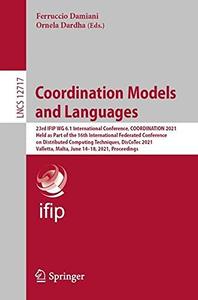 Coordination Models and Languages: 23rd IFIP WG 6.1 International Conference, COORDINATION 2021, Held as Part of the 16th International Federated Conference on Distributed Computing Techniques, DisCoTec 2021, Valletta, Malta, June 14-18, 2021, Proceedings by Ferruccio Damiani English | EPUB | 2021 | 308 Pages | ISBN : 3030781410 | 31.9 MB This book constitutes the refereed proceedings of the 23rd IFIP WG 6.1 International Conference on Coordination Models and Language, COORDINATION 2021, held in Valletta, Malta, in June 2021, as part of the 16th International Federated Conference on Distributed Computing Techniques, DisCoTec 2021. 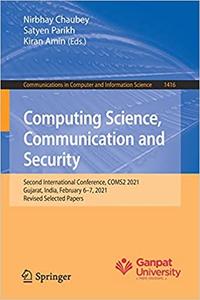 Computing Science, Communication and Security: Second International Conference, COMS2 2021, Gujarat, India, February 6-7, 2021, Revised Selected Papers by Nirbhay Chaubey English | EPUB | 2021 | 300 Pages | ISBN : 3030767752 | 33.1 MB This book constitutes revised selected papers of the Second International Conference on Computing Science, Communication and Security, COMS2 2021, held in Gandhinagar, India, in February 2021. Due to the COVID-19 pandemic the conference was held virtually. 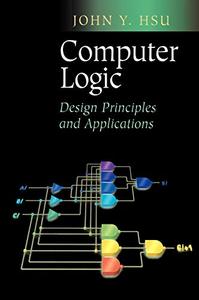 Computer Logic: Design Principles and Applications by John Y. Hsu English | EPUB | 2002 | 208 Pages | ISBN : 0387953043 | 7.2 MB An understanding of modern computer logic - incorporating core knowledge of number systems, number conversions, Boolean algebra, memories, and logic circuits - is fundamental to further study of computer architectures, system software, and computer networks. Computer Logic: Design Principles and Applications introduces and describes the relevant concepts, principles and applications of modern computer logic design.  Computational Advances in Bio and Medical Sciences: 10th International Conference, ICCABS 2020, Virtual Event, December 10-12, 2020, Revised Selected Papers by Sumit Kumar Jha English | EPUB | 2021 | 149 Pages | ISBN : 3030792897 | 19.8 MB This book constitutes the proceedings of the 10th International Conference on Computational Advances in Bio and Medical Sciences, ICCABS 2020, held in December 2020. Due to COVID-19 pandemic the conference was held virtually.  Coding Roblox Games Made Easy: The Ultimate Guide to Creating Games with Roblox Studio and Lua programming by Zander Brumbaugh  Cloud Native with Kubernetes: Deploy, configure, and run modern cloud native applications on Kubernetes by Alexander Raul English | 2020 | ISBN: 1838823077 | 446 Pages | PDF EPUB | 8 MB  Climate Change, Disaster Risks, and Human Security: Asian Experience and Perspectives by Juan M. Pulhin English | EPUB | 2021 | 470 Pages | ISBN : 9811588511 | 60.2 MB This book explores how climate change and disaster risks threaten human security in Asia. Climate change and disaster risks have emerged as major human security challenges in the twenty-first century, and are an imminent "threat multiplier" with the potential to harm the vital core of human life and curtail people's freedom and ability to live with dignity. Climate change and disaster risks undermine the security of individuals, communities, nations, and the world, considering the increasing trend in the frequency and magnitude of hydro-meteorological disasters and the projections on their future adverse impacts.  Cerebrovascular Disorders English | 2021 | ISBN: 1071615297 | 399 Pages | PDF | 10 MB This volume focuses on three areas of neurointervention: aneurysms, non-aneurysmal cerebrovascular malformations, and stroke. Each chapter provides readers with relevant summaries of anatomy, physiology, and clinical presentations, and explores methodologies for diagnosis clinical workup, imaging, and management of each pathological entity. In the Neuromethods series style, chapters include details and advice from the specialists that contains the most up-to-date evidence in an easily digestible format. 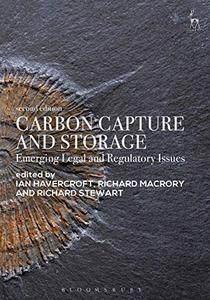 Carbon Capture and Storage: Emerging Legal and Regulatory Issues 2nd Edition by Ian Havercroft, Richard Macrory, Richard Stewart 2018 | ISBN: 1509909583, 1509939490 | English | 400 pages | PDF | 7 MB Carbon Capture and Storage (CCS) is increasingly viewed as one of the most significant ways of dealing with greenhouse gas emissions. Critical to realising its potential will be the design of effective legal regimes at national and international level that can handle the challenges raised but without stifling a new technology of potential great public benefit. These include: long-term liability for storage; regulation of transport; the treatment of stored carbon under emissions trading regimes; issues of property ownership; and, increasingly, the sensitivities of handling the public engagement and perception. 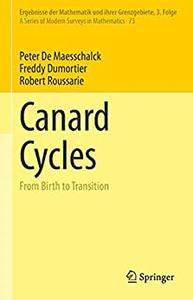 Canard Cycles: From Birth to Transition English | 2021 | ISBN: 3030792323 | 418 Pages | PDF EPUB | 29 MB This book offers the first systematic account of canard cycles, an intriguing phenomenon in the study of ordinary differential equations. The canard cycles are treated in the general context of slow-fast families of two-dimensional vector fields. The central question of controlling the limit cycles is addressed in detail and strong results are presented with complete proofs. |